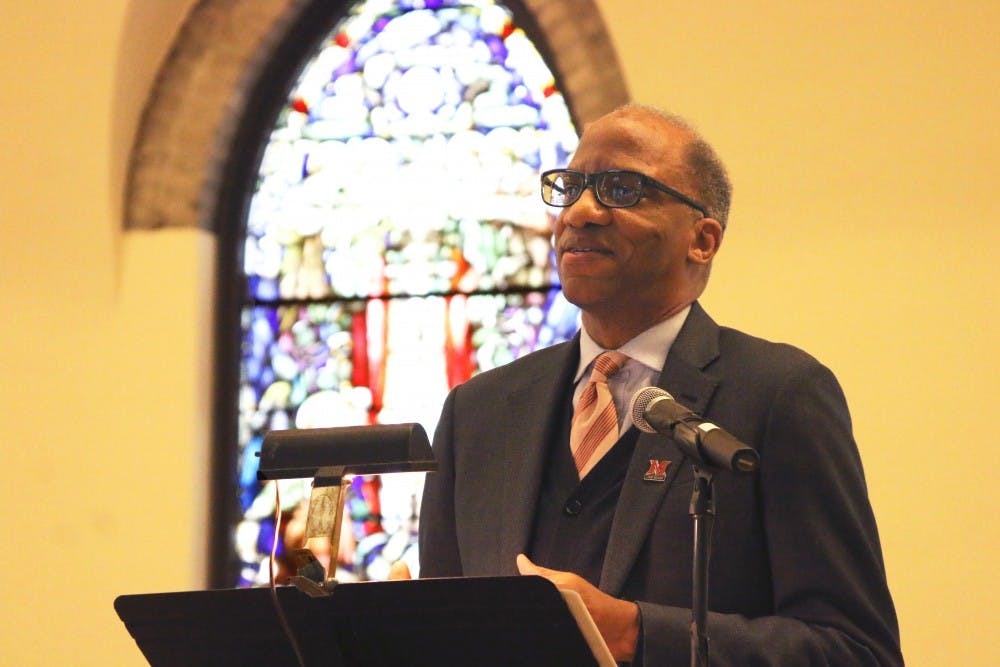Miami's Class of 2022 will be the first to read alumn Wil Haygood's new book, "TIGERLAND: The Miracle on East Broad Street," as part of an exclusive debut.
The incoming class will receive advance copies of "TIGERLAND," which follows two teams at the all-black East High School in Haygood's native Columbus, OH. During the racially turbulent 1968-69 school year, the teams beat bigger, richer and whiter teams to become unexpected state champions in basketball and baseball.
"It is a book about history and race and politics," Haygood said. "Most wonderfully, it is a book about triumph during a very heart wrenching, heartbreaking time in American history."
Haygood, who graduated from Miami in 1976, will also address the students at convocation on Aug. 24, where the class will receive copies of his book almost two months before its official release in mid-October.
The details of the announcement were kept under wraps until early Monday afternoon when Miami president Greg Crawford revealed the news to a crowded Kumler Chapel.
Crawford noted the chapel's location on Western Campus where, during the summer of 1964, college students from around the country gathered before traveling south to register black voters and set up freedom schools.
It was a fitting place, Crawford said, to recognize a Miamian who has devoted his life to "bringing American history to life," particularly the history of African Americans.
"We are grateful for Wil's work and his words," Crawford said.
Haygood gained national acclaim in 2008 after telling the story of Eugene Allen, "a black man unknown to the headlines" who worked as a butler in the White House for over three decades. Haygood first told Allen's story in a 2008 piece for The Washington Post, "A Butler Well Served by This Election," which he later developed into a New York Times bestselling book, "The Butler."
As a Distinguished Scholar-in-Residence for Miami's Department of Media, Journalism and Film, Haygood has taught courses in memoir writing and film studies since joining the faculty in 2014.
Last summer, he was named the 2016-17 Patrick Henry Writing Fellow at Washington College in Chestertown, MD. He's spent the last year traveling around the country interviewing former East High athletes, combing through artifacts from the 1968-69 sports seasons and, of course, writing.
"This is wonderful," Haygood said at Monday's announcement, "after being in a room, alone at a desk for so long. You've made me feel so welcome."
Enjoy what you're reading?
Signup for our newsletter
Haygood recalled some of his undergraduate memories to the students, faculty and administrators gathered in Kumler.
"The seeds of my writing life were planted here at this university," he said.
He remembered wandering around Western Campus ("I was smitten with a Western College student"), and he recalled two professors -- a black woman and a white man -- who served as an "introduction to diversity" for Haygood.
Marian Musgrave, a professor of English, introduced him to the work of black authors like Langston Hughes, Paul Laurence Dunbar and James Baldwin. Milton White allowed Haygood to take his advanced course in creative writing even though Haygood, as an urban studies major, didn't have the prerequisites.
"I don't know if I soared, but I did well," he said of the class.
Haygood also recognized Miami provost Phyllis Callahan, who is one of two people who will appear on the dedication page for "TIGERLAND." She was the first person who suggested Haygood join Miami's faculty.
President Crawford was thrilled to make the announcement about Haygood's book, he said. He has read the "TIGERLAND" manuscript -- complete with Haygood's notes in the margins -- but doesn't know how the book ends.
"I've seen everything but the last chapter," he said.
Typically, incoming Miami students receive a book during summer orientation as part of the university's Summer Reading Program. Students are asked to read the book and be prepared to discuss it in small breakout sessions after convocation.
This year, since students will not receive their copies of "TIGERLAND" until August, incoming first-years will be asked to prepare for the school year by consuming media over the summer -- including speeches, songs, poetry and art -- which will contextualize Haygood's narrative and give them a better understanding of the racial issues of the late sixties.
Those months following the assassinations of Martin Luther King Jr. and Bobby Kennedy were a tumultuous time, Haygood said, but students are facing another period of challenging race relations now.
"I'm not naive enough to think one book will change that," Haygood said. "But I am of the mind that this book can help us understand why we are stronger together."
willi501@miamioh.edu



